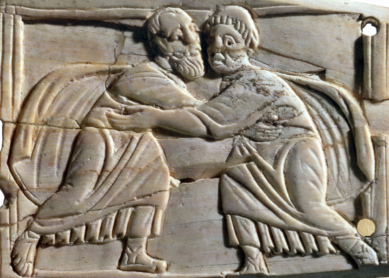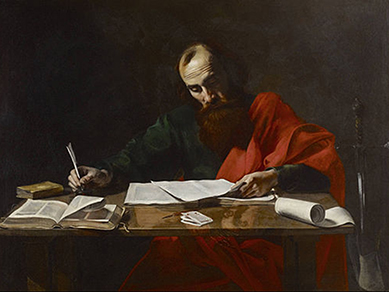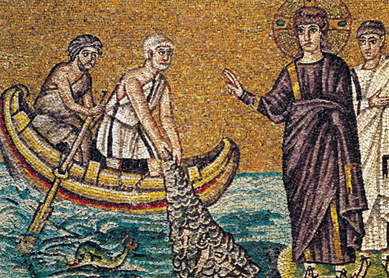Two cities named Antioch played important roles in the first-century Christian community. Antioch of Pisidia was one of the main stops on Paul’s missionary itinerary. Further east, Antioch of Syria on the Orontes seems to have been the cradle of early Jewish-Gentile Christianity. The New Testament writings only mention the first Antioch in passing, and Paul wrote no existing letters to the churches in either city. But Paul’s Letter to the Galatians and Luke’s Acts of the Apostles offer tantalizing clues about early Christian debates among communities in the second Antioch. With these literary clues, scholars attempt to reconstruct the first-century Jewish community in Antioch of Syria. They especially want to know what role the Jews of Antioch played in transmitting Jesus’ message to the Gentiles.
Which Antioch and where?
New Testament writings refer to two cities of the same name: Antioch of Syria and Antioch of Pisidia. A family of Syrian kings who ruled much of Asia under the name Antiochus built both cities. The most infamous of these kings was Antiochus IV, whom Polybius called a “madman” because of his unstable personality. During his reign (175-164 B.C.E.) Jews revolted against his harsh treatment. In return, Antiochus IV outlawed Jewish practices and in 167 B.C.E. dedicated the altar of the Jerusalem temple to Zeus. When Antiochus IV executed Jews who refused to give up their Scriptures or their piety, many fled Jerusalem. Some went south to Egypt; others went north to Syria, ironically, to seek refuge in the city fortified by the same Antiochus IV. Today Antioch of Syria sits on the border between Turkey and Syria, and the festival of Hanukkah remembers Jewish suffering under Antiochus IV.
Two centuries later, the Diaspora Jewish community of Antioch flourished. Here, in Antioch of Syria, Paul stopped persecuting Christian Jews and learned about Jesus from Christian teachers—many from Jewish families that had survived Antiochus IV. Paul then launched his traveling ministry from Antioch of Syria and traveled west, stopping in Antioch of Pisidia, where he preached in synagogues, recruited patrons, and angered the leaders of the city.
In New Testament times, both cities called Antioch were thriving Roman colonies with significant Jewish populations. The bigger of the two, Antioch of Syria, sat on the Orontes River on the trade route between China in the east and Rome in the west. The first-century Jewish historian Josephus described Antioch of Syria as the third-largest city in the Roman Empire (War 3.2.4 #29). New Testament scholar John Meier and others argue that Matthew wrote his Gospel in Antioch of Syria.
Did Peter and Paul duke it out in Antioch?
In the early to mid-first century C.E., Paul and Peter engaged in a theological standoff. The standoff took place in the heart of the early Christian community: Antioch of Syria on the Orontes (Gal 2:11). Paul reports publicly opposing Peter for eating with Gentiles and then separating from them to appease a Jewish-Christian party from Jerusalem. The early church had to sort out these questions: Was it necessary to observe the dietary practices of Torah in order to be Christian? And, more specifically, could Jewish Christians eat the same foods or eat at the same table with Gentile Christians? This was an old argument among Jews. They had developed multiple rules to regulate eating in the presence of Gentiles. But Antioch was different: the question of Jews and Gentiles who followed Jesus eating together would determine Christian communion practices and Christian identity for the next two thousand years.
Paul argued that in Christ, everyone—Jew or Gentile—could eat the same food at the same table. Peter observed a more flexible practice. According to Paul, Peter followed Jewish regulations when eating with Jews and then abandoned such regulations when eating with Gentiles in mixed company. Paul denounced Peter as a hypocrite and stormed off. But the question of table etiquette continues today when Christians are invited to, or barred from, sharing communion across the boundaries of theology and tradition.
The Jews and Christians in Syrian Antioch knew Peter and Paul well. Paul claims his ministry was centered in the Cilicia-Syria region for 14 years. It is likely he engaged in mission trips during this time that went west to Asia Minor and Rome (Gal 1:21-2:1). At the same time, Peter’s center of ministry shifted between Jerusalem and Antioch.
Historians and theologians debate who won the standoff. Based on historical outcomes and the preservation of Paul’s letters (rather than his opponents’ letters), Paul’s argument that Gentiles come to Christ apart from the Jewish law and regulations seems to have won. However, in his letters, Paul encourages Gentiles to demonstrate their goodwill and to serve the leaders in Jerusalem through a financial offering collected from Gentile churches (1Cor 16:1-4, Rom 15:25-29, Gal 2:11-14).
Acts tells a slightly different story. In that book, Peter is the key advocate for the inclusion of Gentiles in Judea and Jerusalem, following a revelatory dream (Acts 11). That revelation inspires Barnabas and Paul’s mission to Judea to advocate for the same position. In Acts, the rift between Peter and Paul, Jerusalem and Antioch, is smoothed over and the path is paved for the expansion of Christianity.





